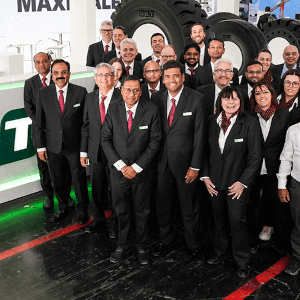Our third episode of Global Trends OTR is now live, this time focussing on the topical subject of alternative energies. Join host Saana Azzam, along with this episode’s special guests - Paul Muller and Jonathan Cohen - as we take a deep dive into the technology behind alternative energies, and the benefits of adopting alternative energy sources for more sustainable practices in the business environment.
Alternative Energies
Alternative energy refers to energy sources that are not based on the burning of fossil fuels or the splitting of atoms. The term "alternative" presupposes a set of undesirable energy technologies, fossil fuels such as coal, natural gas, and oil, which produce carbon dioxide, the primary cause of global warming, when burned. Alternative energy sources are renewable and are thought to be "free" energy sources. They all have lower carbon emissions, compared to conventional energy sources. These include biomass energy, wind energy, solar energy, geothermal energy, hydroelectric energy sources, and nuclear power.
Why is ‘Alternative Energy’ a Hot Topic?
There are a multitude of reasons why alternative energy sources have gained popularity in recent years - most notably relating to environmental factors. Below we’ve outlined some of the most prominent reasons behind the global interest in alternative energy.
Renewability: Traditional energy sources such as coal, oil, and gas are non-renewable. This means they can be depleted and are not sustainable in the long term. On the other hand, alternative energy sources like solar, wind, and hydroelectric power are renewable, meaning they replenish naturally and are sustainable.
Emissions: Traditional energy sources produce a large amount of carbon dioxide when burned, which contributes to global warming and climate change. Alternative energy sources produce very little to no greenhouse gas emissions.
Cost: The initial cost of setting up renewable energy technologies can be high, but the operating costs are generally lower and, over time, can be more cost-effective. Traditional energy sources, on the other hand, often have lower initial costs but higher operating costs, especially when environmental costs are considered.
Energy Efficiency: Alternative energy sources such as solar and wind power are generally more energy efficient than traditional energy sources. This means that they use less energy to produce the same amount of electricity.
Dependency: Dependency on foreign oil and natural gas can lead to geopolitical conflicts and volatility in energy prices. Alternative energy sources can reduce this dependency, leading to greater energy security.
Availability: The availability of fossil fuels can vary by region, and extraction can become more difficult and costly over time. In contrast, renewable resources like the sun and wind are available in varying degrees across the globe, and harnessing such resources does not deplete the source.
In this episode of global trends, we highlight the importance of alternative energies, focussing primarily on its capacity to reduce environmental impact vs traditional energy sources.
What are some of the latest technologies in Alternative Energies?
Throughout this exciting episode, we explore some of the latest technologies that are fuelling the future of alternative energy. This includes:
-
Electrification, to help OEMs power many machines and 48V solutions suited to smaller applications.
-
The use of ‘drop in fuels’ like HVO - Hydrotreated Vegetable Oil that is used in place of diesel in an internal combustion engine, to reduce the average lifecycle of CO2 emissions.
-
The invention of the world’s first non-detonating blasting product, used in demolition projects and mines, explicitly targeting where the impact should occur, with minimal damage to the surrounding area.
Who’s joining us?
Paul Muller, Technical Engineer at Perkins Engines, UK.
Paul Muller is a technical engineer at Perkins Engines, UK, boasting an impressive 20-year career in off-highway powertrain development. His expertise spans multiple countries, including the UK, Japan, and Germany, where he has significantly contributed to advancing cutting-edge engine systems and hydraulic excavator technology.
In his recent role, Paul has led future power systems, with a particular emphasis on electrification and low-carbon-intensity fuels. His invaluable work at Perkins Engines drives innovation and pushes the boundaries of powertrain development. By actively working towards a more sustainable future for the industry and the planet, Paul Muller is making a substantial impact on creating a greener and more environmentally conscious world.
Jonathan Cohen, Director of Operations at Autostem Technology, South Africa.
Jonathan Cohen, the Director of Operations at AutoStem Technology in South Africa, brings a wealth of expertise to the table with over 11 years of experience in the explosives industry. He has played a pivotal role in the company, significantly developing the AutoStem range of non-detonating explosives. Jonathan's profound understanding of both the product and the market has been instrumental in propelling the global commercialization of AutoStem's cutting-edge technology.
Jonathan has consistently demonstrated his aptitude for innovation and product development throughout his career. His expertise is required in various client projects across diverse sectors, including mining, construction, and demolition. By leveraging his knowledge and skills, Jonathan has successfully spearheaded the creation of new products and processes, establishing himself as a force in advancing technological solutions for explosive applications.
Where can I watch Episode Three?
Are you excited to explore new horizons? Discover the significance of embracing Alternative Energies by watching the episode here.
For more details on BKT's comprehensive Global Trends OTR series, You can find additional information below:
Episode One: Technology, Automation, and Robotics in OTR - watch here.
Episode Two: Sustainability and ESG - watch here.
Episode Three: Alternative Energies - watch here.
Episode Four: Net Zero and Low Carbon Emissions - 20 June 2023 - STAY TUNED!






.jpg)